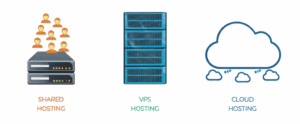- Understanding the Web Hosting Landscape
- Web Hosting: Exploring Shared Hosting
- Web Hosting: Delving into VPS Hosting
- Web Hosting: Reaching for the Cloud
- Choosing the Right Web Hosting Solution
Web Hosting: Best Shared, VPS, or Cloud?
Web hosting is the foundation of any online presence. Choosing the right type of hosting—shared, VPS, or cloud—is crucial for your website’s performance, security, and scalability. Making an informed decision requires understanding the nuances of each option and how they align with your specific needs. This article delves into the details of each hosting type, comparing their strengths and weaknesses to help you determine the best fit for your website.
Understanding the Web Hosting Landscape

Before diving into the specifics of each type, it’s essential to grasp the fundamental concept of web hosting. Simply put, web hosting provides the server space and resources necessary to store and deliver your website’s files to visitors around the globe. When someone types your domain name into their browser, their request is routed to your web server, which then sends the relevant files to display your website.
Web Hosting: Exploring Shared Hosting
Shared hosting is the entry-level option, often the most affordable and easiest to manage. In this setup, multiple websites share the resources of a single server. Think of it like an apartment building: everyone lives under one roof, sharing utilities and amenities.
Pros:
Cost-effective: Shared hosting is generally the cheapest option, making it ideal for beginners and those on a tight budget.
Ease of use: Most shared hosting providers offer user-friendly control panels and tools, simplifying website management.
Minimal technical expertise required: You don’t need advanced server administration skills to manage a shared hosting account.
Cons:
Limited resources: Sharing resources can lead to performance issues if another website on the same server experiences a traffic surge. This is known as the “noisy neighbor” effect.
Security concerns: While reputable providers implement security measures, sharing a server inherently increases the risk of vulnerabilities if one site is compromised.
Scalability limitations: Shared hosting isn’t ideal for websites expecting significant traffic growth, as resources are limited.
Web Hosting: Delving into VPS Hosting
VPS (Virtual Private Server) hosting offers a middle ground between shared hosting and dedicated servers. It utilizes virtualization technology to partition a single physical server into multiple virtual servers, each acting as an independent environment. Imagine it like owning a condo within a larger building – you have your own dedicated space and resources, while still sharing the underlying infrastructure.
Pros:
Enhanced performance: VPS hosting provides dedicated resources, ensuring better performance and stability compared to shared hosting.
Greater control: You have more control over your server environment, including the operating system and software configurations.
Improved security: The isolated environment of a VPS offers better security than shared hosting, minimizing the impact of vulnerabilities on other users.
Scalability: VPS hosting allows for easier scaling of resources as your website grows.
Cons:
Higher cost: VPS hosting is more expensive than shared hosting.
Requires some technical expertise: Managing a VPS requires a basic understanding of server administration.
Web Hosting: Reaching for the Cloud
Cloud hosting utilizes a network of interconnected servers to distribute website resources, offering unparalleled redundancy and scalability. Think of it like a vast network of interconnected power grids, ensuring continuous availability even if one grid fails.
Pros:
High availability and reliability: Cloud hosting minimizes downtime through redundancy and automatic failover mechanisms.
Unmatched scalability: Resources can be scaled up or down on demand, allowing your website to handle traffic spikes effortlessly.
Pay-as-you-go pricing: You typically pay only for the resources you consume, making it a flexible and cost-effective solution for fluctuating traffic.
Enhanced security: Cloud providers invest heavily in security infrastructure and expertise, providing robust protection against threats.
Cons:
Cost can be complex: While scalable, cloud hosting costs can become unpredictable if not carefully managed.
Requires technical knowledge: Optimizing and managing cloud resources often requires specialized expertise.
Choosing the Right Web Hosting Solution
Ultimately, the best web hosting solution depends on your individual needs and priorities. Consider the following factors when making your decision:
Budget: Shared hosting is the most affordable option, while cloud hosting offers flexible pricing based on resource consumption.
Technical expertise: Shared hosting requires minimal technical skills, while VPS and cloud hosting demand some server administration knowledge.
Traffic expectations: Shared hosting suits low-traffic websites, while VPS and cloud hosting are better equipped for growing or high-traffic sites.
Security requirements: Cloud hosting generally offers the most robust security features.
* Scalability needs: Cloud hosting provides the greatest scalability, followed by VPS hosting.
By carefully evaluating these factors and understanding the characteristics of each hosting type, you can confidently choose the best web hosting solution to power your online presence.











Leave a Reply